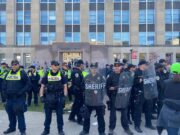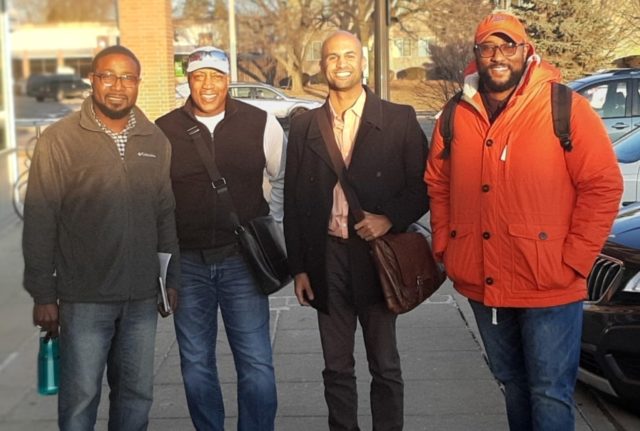African-Americans have been disproportionately sickened and killed by the coronavirus pandemic and many black men, especially, have underlying health conditions, including asthma and heart disease, that make them more vulnerable to complications from the coronavirus. This Saturday’s Black Male’s Mental Health and Well-Being Facebook Live Support event will be a chance for men to ask health-related questions of an expert panel on any topics they choose.
“This will be a great chance to review what are some helpful things to be doing to protect yourself and to strengthen your emotional mindset, along with your physical health and well-being, while going through the effects of the coronavirus pandemic right now,” Dr. Logan Edwards, one of the panelists for the event, tells Madison365.
The Black Male’s Mental Health and Well-Being Facebook Live Support Group will take place Saturday, April 4, 1-2:30 p.m. The event will be hosted by Aaron Perry, the founder of Rebalanced-Life Wellness Association who is responsible for launching the Men’s Health and Wellness Center inside of JP Hair Design, the largest black barbershop in Madison.
The event will also feature panelists Dr. Alvin Thomas, Dr. Logan Edwards, Dr. Jonas Lee, and Haywood Simmons. The experts will be there to answer questions from black men dealing with the coronavirus pandemic like what am I supposed to be thinking? What am I supposed to be feeling? What am I supposed to be doing during this unprecedented time that we’re all going through at the same time?
The Black Male’s Mental Health and Well-Being Facebook Live Support Group will offer ideas for best mental health and self-care practices. There will be a discussion on the problems that arise from the lack of discussion of these important health topics by men in our society.
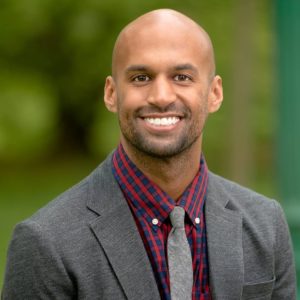
“I think that as men in this culture we are often doing a disservice when it comes to our own mental, emotional health and well-being because we have been cultured and stigmatized into keeping silent,” Dr. Edwards says. “That silence feeds into more stigma and that stigma leads into more silence and it becomes this revolving vicious cycle of poor mental, emotional and spiritual health for men.
“We do have some tough emotions that we’re going through right now. And it doesn’t mean weakness – it means strength – to have the courage to speak truth to that and to talk about if we’re scared, sad, crying or lonely,” Edwards adds. “That stuff is all 100 percent OK and emotionally healthy to do. As men, I think we can reverse some of those messages that we’ve been fed about strength and about ‘this is what being a man is.’”
The Black Male’s Mental Health and Well-Being Facebook Live Support will provide support for a group often ignored. Perry pulled together the event after seeing how the coronavirus pandemic affected black men in his hometown of Milwaukee.
“What we do know is that middle-aged African American men in Milwaukee appear to be the largest group that is impacted in terms of death right now from the coronavirus,” Perry says. “These are in many cases men that are retired police officers and firefighters. These are men who have done well in their careers.”
Perry emphasizes three points that we need to be on top of when it comes to African American men.
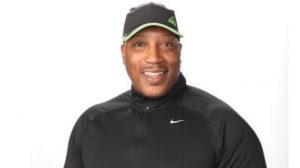
“Number one, we have to follow the CDC recommendations on self-care during this coronavirus pandemic. The second one, which I believe is the most important, is that we simply have to as black men be in good health. Period,” he says. “Because if we are in good health, then we’re able to fight off these viruses if we are infected. If we are in good health, it will likely increase our chances of survival.
“Point three, we have to know our health status. We have to know our health history because at the end of the day, the doctors and the health care professionals have to know what they are dealing with when it comes to us,” Perry adds. “If we’re able to stay on top of these three things, we will be able to see this virus in a different light. We will be able to attack it differently.”
African-American men face health challenges and barriers that other groups do not face.
“That machismo factor I mentioned before concerning all men … it will be a challenge to break through that with black men. Along with that, we’re talking about stigma with the health care system itself where a lot of black and brown men don’t trust the white man or the white woman that they have to go talk about their mental or physical health condition with,” Dr. Edwards says. “They stop themselves from going and getting that help because they’ve stigmatized the health care system.
“Even if they did want to go, access and availability can be a problem … or they can’t afford it,” he adds. “There are so many barriers. Who are they left to talk to? They don’t want to come out to the women in their lives, their children. That can’t appear weak to them. They have to be the tough one, the strong one … the one that’s got it together. As black men, who do you go to?”
The Facebook Live Support group panelists are requesting questions from black males concerning their fears and thoughts during the coronavirus pandemic. Perry is hoping for a big virtual attendance.
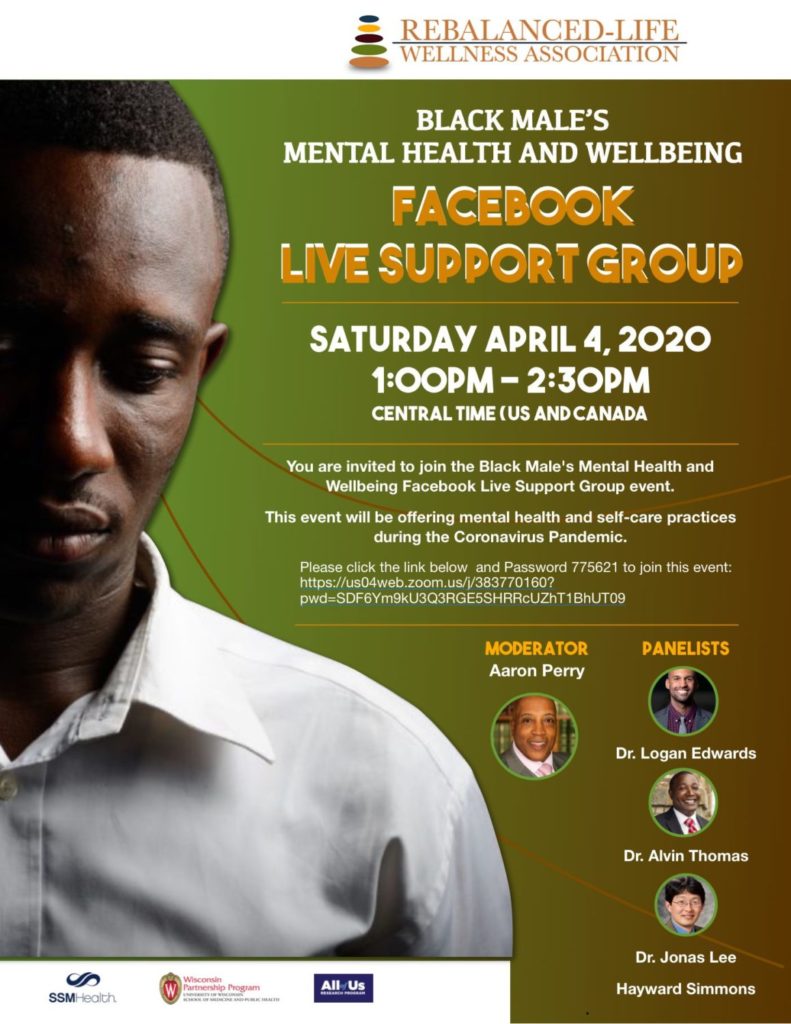
“Right now, we have groups of African-American men from Raine; Milwaukee; Columbus, Ohio; Detroit, Michigan; and Phoenix, Arizona who are all committed to participating in this Facebook Live session,” Perry says. “We’re starting to get a very broad reach of men who understand that what we’re dealing with here in Dane County, they are dealing with in their own communities as well.”
Dr. Edwards hopes that the men get validation for how they are thinking and feeling and struggling through the situation.
“I hope that validation and affirmation let them realize that they are not alone in this and that it’s OK for them not to be doing OK through this and that there’s always help available and there are other black and brown men going through the same things,” Edwards says. “I hope they use that knowledge as a reason to connect with us and to other people and not as a reason to further isolate themselves emotionally.
“I want them to leave with some sense of hope that they will get through this,” he adds. “Everything is going to be OK. In fact, I want them to be encouraged that they will come out of this stronger if they so choose .. mentally, emotionally, physically, socially, spiritually stronger.”
For more information about the Black Male’s Mental Health and Well-Being Facebook Live Support Group or to e-mail questions to be answered at the event, e-mail Aaron Perr at [email protected].

